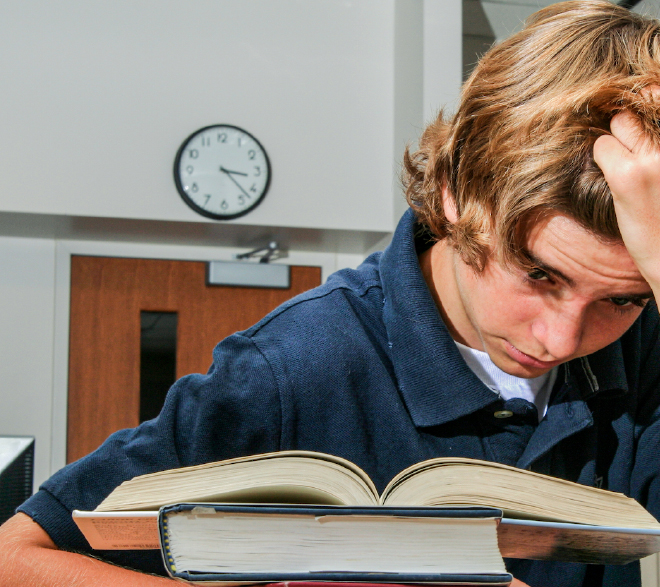Study tips for Year 11 and 12 Mathematics students

Most students consider their final exams as the pinnacle of their education and the most important part of their future aspirations. While a good ATAR can mean that you will get into the degree of your choice, it is not the only way to reach your goals.
For Mathematics, the best thing you can do is to set some achievable goals and develop good study habits to prepare well for the exam. If you know you’ve done everything possible, then you’ll be more confident in the exam and therefore less anxious.
How?
Start early, don’t leave it until a month out from the exam. Plan a study timetable that commits you to a certain amount of time each day throughout the week – make sure you are not too tired, too hungry, too cold, too hot etc.
Find a place that’s quiet and not distracting – consider the school library, your bedroom, study, or local coffee shop if it helps.
Tell your family and friends that you’re studying so they don’t disturb you during that time.
Turn off social media, text messages and phone calls as notifications interrupt your thought processes.
Turn off the TV – TV shows and conversations around you will compete with for your attention and impact memory formation.
Some students like to listen to music while studying. There’s research that suggests that music with lyrics and heavy beats can be distracting, as the brain struggles to process both the lyrics and what you’re studying. Other research indicates that ambient music changes the mood and therefore contributes to memory formation. Whatever your preference, try and keep the sound low.
What?
Effective preparation for end of year exams can typically be done from Year 7 onwards by compiling a learning log for every topic. These might comprise mind-maps, examples of how to do something or simply explanations. Learning logs are a summary of a topic in your own words and are a great way to commence and track your studying journey.
For end of school exam preparation, its useful to compile your learning logs on all the topics from Years 11 and 12. If you’re permitted to bring pre-prepared notes into your Year 12 exam, you can begin to compile those using your learning logs as a basis. Research shows that handwriting a learning log is more beneficial to learning. A word of caution - you should scan and save it in a folder on your computer so that you have a digital version just in case you lose the hard copy.
Carry your learning logs or your pre-prepared notes with you everywhere and revise them on the bus, in the car or anywhere else that you have a few minutes to spare. This way you’ll be familiar with the location of specific concepts in your notes so you don’t have to waste valuable time searching for them during the exam.
Become familiar with your formula sheet in Years 11 and 12. As you learn new concepts, colour code and write explanations in your own words on the sheets. Colours are often easier to recall when under exam pressure.
Refer to the syllabus rather than relying solely on textbooks. Textbooks are an excellent resource, but they don’t always cover every single syllabus dot point.
In the weeks leading up to the final exam gather up past papers and do them repeatedly. Complete them under timed conditions. Familiarise yourself with the structure and style of questions and the overall composition of the paper itself.
Don’t just memorise procedures and formulae. Make sure you understand the concept, the topic and the application of the formula. When you understand something at a deeper level, you can apply your knowledge in different ways to unfamiliar questions.
Who?
Ask for feedback and help from your teachers, older siblings, parents or your tutor. Don’t leave it too late. Asking last-minute questions two weeks out from the exam might cause you to panic!
Ask some of your friends if they’d like to set up a study group – be disciplined. Helping each other can often assist you in gaining a better understanding than trying to study alone.
Find out from your local Education Authority what resources you can take into your examination. Do you need a ruler, protractor or anything else? Make sure that your calculator or calculators are on the approved list. Check if you must use a specific colour pen; bring more than two just in case you run out of ink! Bring several sharpened pencils.
When?
In the exam, use your reading time (if available) to read through the paper carefully. Identify where the marks are allocated.
Keep an eye on the time and don’t spend too much time on one-mark questions.
Show all your working out. Don’t rub out or scribble out any workings. Simply draw a line through it. If the working or answer is correct, even if it’s crossed out, markers will usually still award marks.
Do your drawings in pencil and draw over them carefully in pen.
Remember – exams are only a small part of your learning journey, the results of which will not define you forever.
This month is the launch of #ATARanxiety, a campaign encouraging students to shift focus from the final number to what they can do today. The campaign from Cluey Learning will see the Australian ed-tech brand share practical studying tips, extend office hours and provide free subscriptions to mindfulness app Calm.